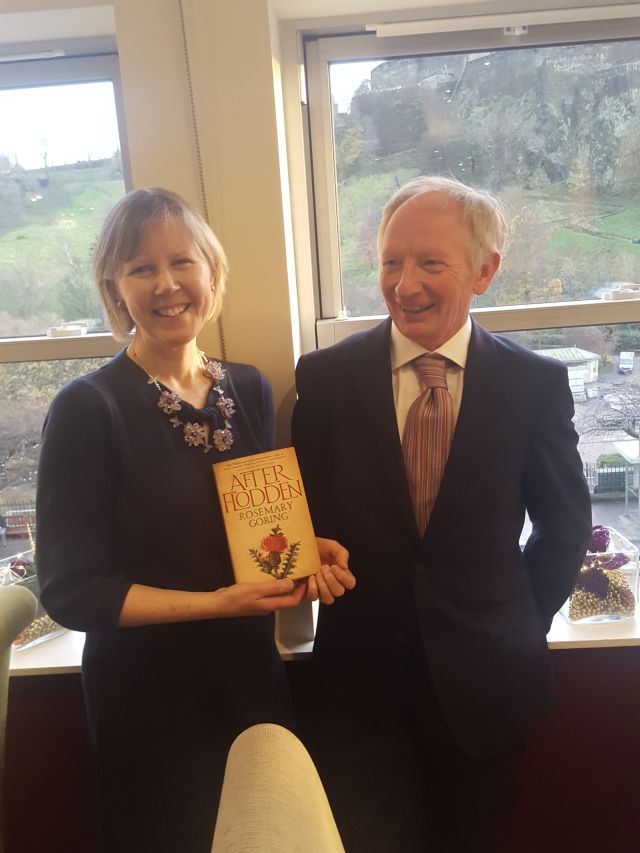
A French novelist on hearing of After Flodden asked Rosemary “how many did you kill?”, which was a reminder of her own bewilderment at that period of history which had first prompted her interest. King James IV has often been seen as a dreadful human being, but historian Norman MacDougall contends that until his last day he did nothing wrong, having presided over a period of prosperity exemplified by Falkland Palace and commanded influence seen in his successful (despite many mistresses) marriage to Margaret Tudor, daughter of Henry VIII of England.
The French novelist had never heard of Flodden, so was unaware of how her countrymen let the Scots down by their late appearance. The ruin and mayhem that followed the loss of ten thousand Scots lives meant that Scotland would never be the same again, and having discovered the King's secretary Sir Patrick Paniter in historical records Rosemary determined to tell the story of the aftermath from his perspective.
Hailing from Montrose, Sir Patrick had been tutor to James's son Alexander and despite being licentious was about to go into Holy Orders when prevailed on to join the Court. A letter from James IV to the Pope advised that any communication not cosigned by Sir Patrick should be regarded as a fake.
Rosemary was writing her novel at the time of the Iraq War, and the suicide of Dr David Kelly helped bring to the fore the question of who was advising the leaders, which made her see Sir Patrick as an Alastair Campbell of his day. The Border characters that she introduced to the story were inspired by the area's rugby players of today, tough and committed to what they had to do, but not evil and cast against a poverty-stricken landscape in which the whole of Northumberland was thought to have boasted only four carts. She introduced one or two other real characters including Thomas Dacre, Lord Warden of the King's Marches who would go on to face trial before Cardinal Wolsey in the Star Chamber.
Hailing Muriel Spark as the greatest Scottish writer of the last hundred years, Alan Taylor said that the Floo'ers o' the Forest were also a reference to the Fallen of the Great War whose demise left her most famous character Miss Jean Brodie a spinster. Muriel had one brother Philip, and it was in the Royal OverSeas League that she met her husband Sydney Oswald Spark whose initials she would say afterwards should have warned her off him, but instead they married and she followed him to Rhodesia.
2018 sees the centenary of her birth which will be marked by a series of events at the Usher Hall and elsewhere, with a writers' programme and exhibition at the National Library opening on 8 December. Reared by her parents in their Bruntsfield flat, she walked from there to James Gillespie's High School, the Marcia Blane's of Miss Jean Brodie, and to Morningside Public Library. Her favourite teacher Miss Christina Kay recognised her at just eleven as a dreamer, telling her that she was destined to be a writer, and after coming home in the middle of the Second World War she left her son Robin with her parents while making her way in London, when her output was at its most productive during 1957-61, a period whose six novels including Memento Mori culminated in the New Yorker serialisation of The Prime of Miss Jean Brodie.
Putting everything on the pitch, she had no time for fame, leaving when it got in her way and settling for her last forty years with her companion Penelope in the Italian town of Arrezzo. She was always glamorous, enquiring of Alan where he bought his clothes and had his hair cut, and suffered the irreconcilability of the relationship with Robin whose response to her leaving him in the care of grandparents was to accuse her of casting doubt on his Jewishness, but it is for her productivity that she should be remembered, with an output of twenty-three novels including effectively an autobiography Curriculum Vitae, essays and plays. When she fell out with someone, she would bide her time for building them into a novel, as Marie Stopes was to discover. Distance enabled her to write more objectively about home, and the film of Miss Jean Brodie struck her as making Edinburgh look too beautiful, with viewers coming to suppose that it was Maggie Smith who had invented the character.